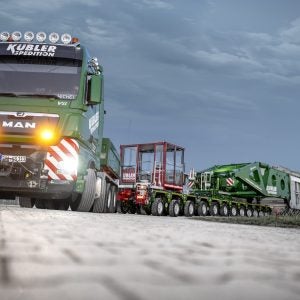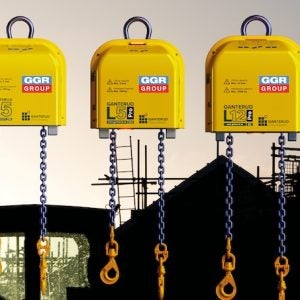Throughout his career Richard Baldwin has been one of the most charismatic figures in the UK crane industry, with a presence bolstered by physical size.
Baldwins was incorporated as a crane hire company in 1977 and soon grew to be one of the UK’s leading crane rental companies during the UK construction boom of the 1980s.
In October 1994 both the man and his company pleaded guilty in court to faking crawler crane test certificates. The charges related to a four-year period up to November 1991. Richard Baldwin was fined £20,000 and the company was fined £70,000.
‘If prison were an option open to me today you would be sent to prison,’ Judge George Bathurst-Norman told him. ‘Not only was there no system for testing cranes, but the certificates themselves were false. The criminality in this case is in a category of its own. There is no offence which is more grave than a managing director of a company of this kind signing these forms one after another, purporting to have examined a crane and not having done so.’
Instead of going to prison Baldwin achieved respectability in 1998 when Baldwins Industrial Services floated on the London Stock Exchange, with former UK government minister Lord (John) Patten on the board of directors. Richard Baldwin and his family retained a 63% shareholding.
With money from the flotation Baldwins embarked on expansion. The first acquisition was Loadtite, a supplier of lifting gear based in the west of England. The big move came in September 1999 when Baldwins bought Texas-based Phillips Crane & Rigging for $12.5m. Immediately Baldwin set about trading in Phillips’ fleet of 26 cranes and took delivery of 23 new Liebherr all terrains – including two 300 tonners, two 500 tonners and a 1,000 tonner – four 100t Demag ATs, four 25t Demag city cranes and two Kobelco CK 2500 crawler cranes. Group turnover rose to £50m ($75m), but so did borrowings. Gearing soared passed 300%.
It was not long before Baldwins/Phillips was getting a reputation in the USA of paying employees very well, bidding for work with highly competitive prices, and generally upsetting the status quo of the crane rental industry in the region. The US plan was based on using city cranes to compete with RTs, using small ATs to beat telescopic truck cranes, and large telescopics to beat lattice boom crawlers and conventional truck cranes.
Problems set in and US operations were blamed for the pre-tax loss of £14.4m ($22m) that the group recorded for the year to 31 March 2002. A £1m ($1.5m) write-off after the collapse of Independent Insurance did not help either.
On 26 August 2002 Baldwins Industrial Services Inc (trading as Phillips Crane & Rigging) and Baldwins Leasing LP filed proceedings under Chapter 11 of the US Bankruptcy Code.
Corss-company guarantees meant that it was only a matter of time before the whole company collapsed. The UK parent had guaranteed £7.2m ($10.5m) in US finance lease obligations and £3.6m in respect of operating leases. On 28 October administrative receivers were called in at Baldwins Industrial Services Plc.
‘America was a poorly conceived plan,’ says Rick Barnett, who joined Baldwins as UK managing director in May 2001 and is now leading the management buyout bid for the UK operations. Richard Baldwin and his son Wayne, the operations director, left the company within days of the receivers moving in.






